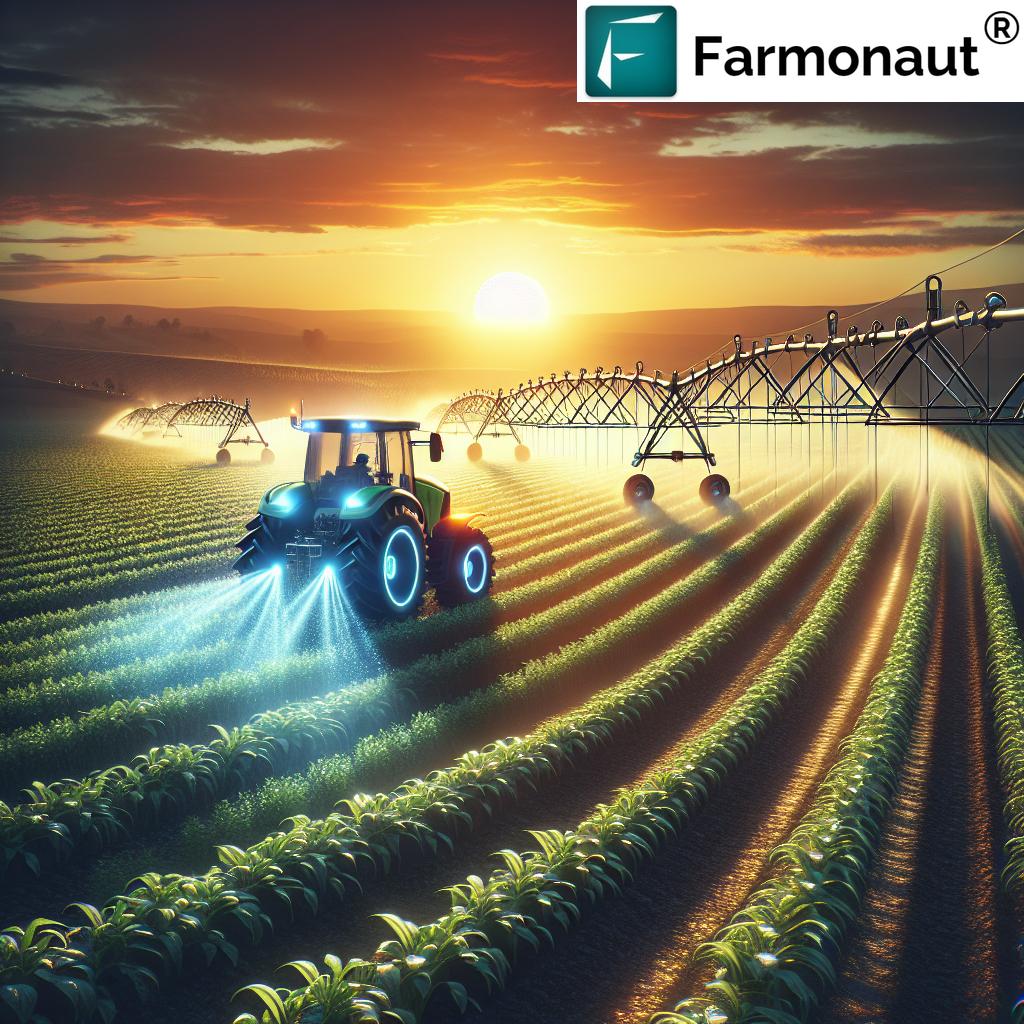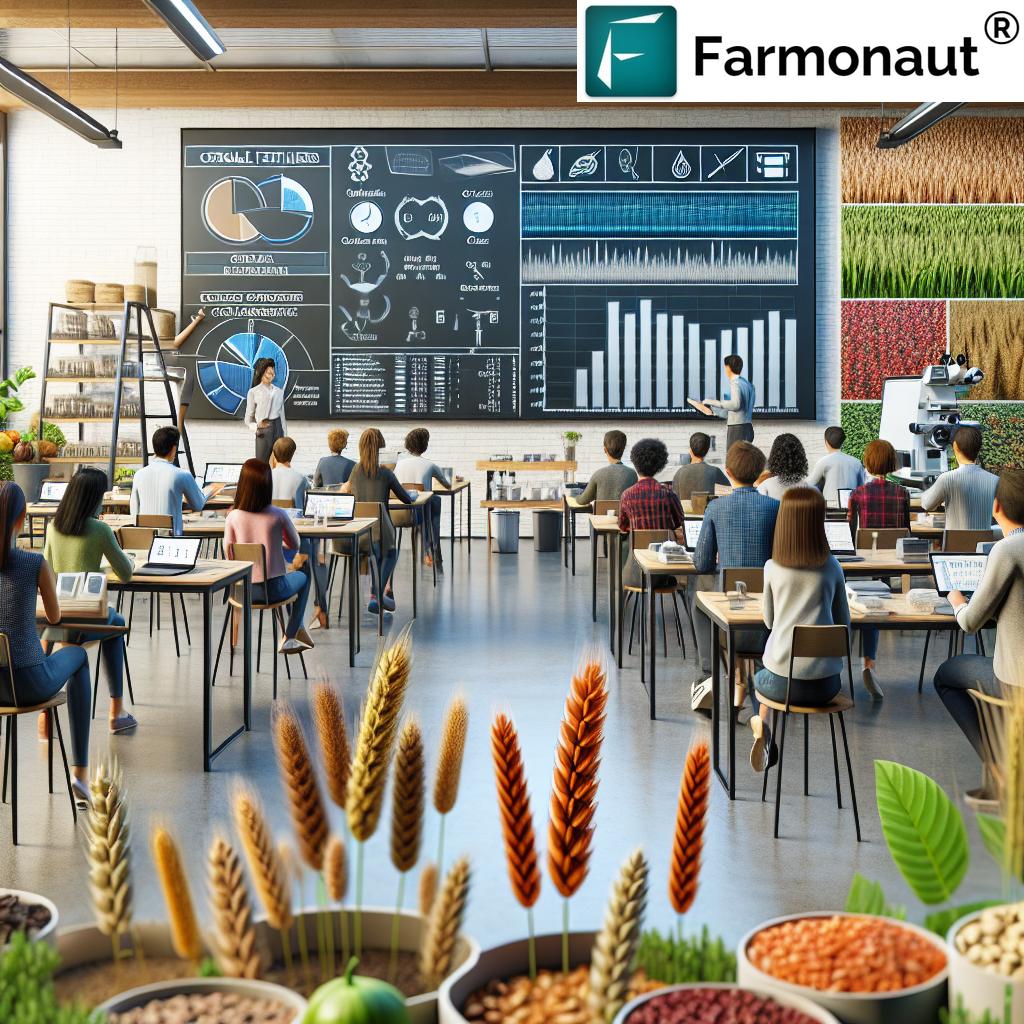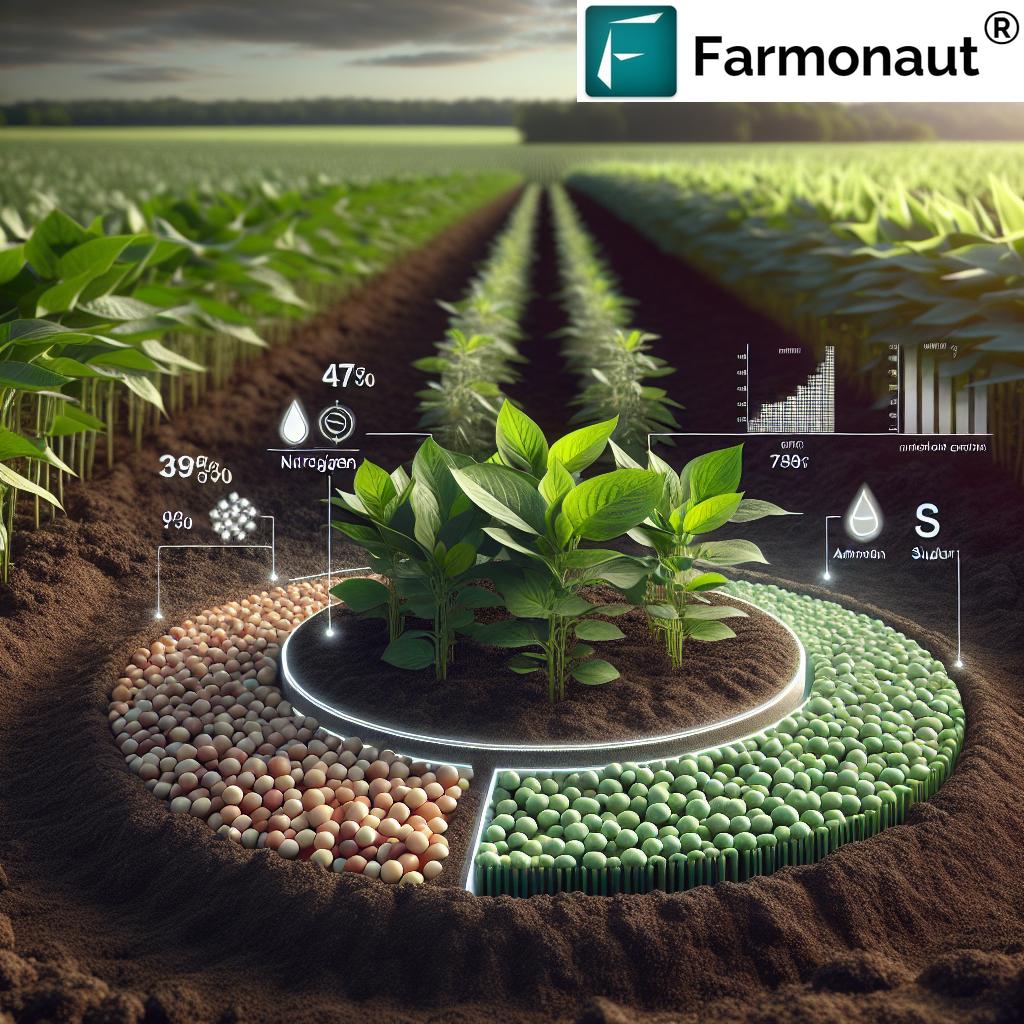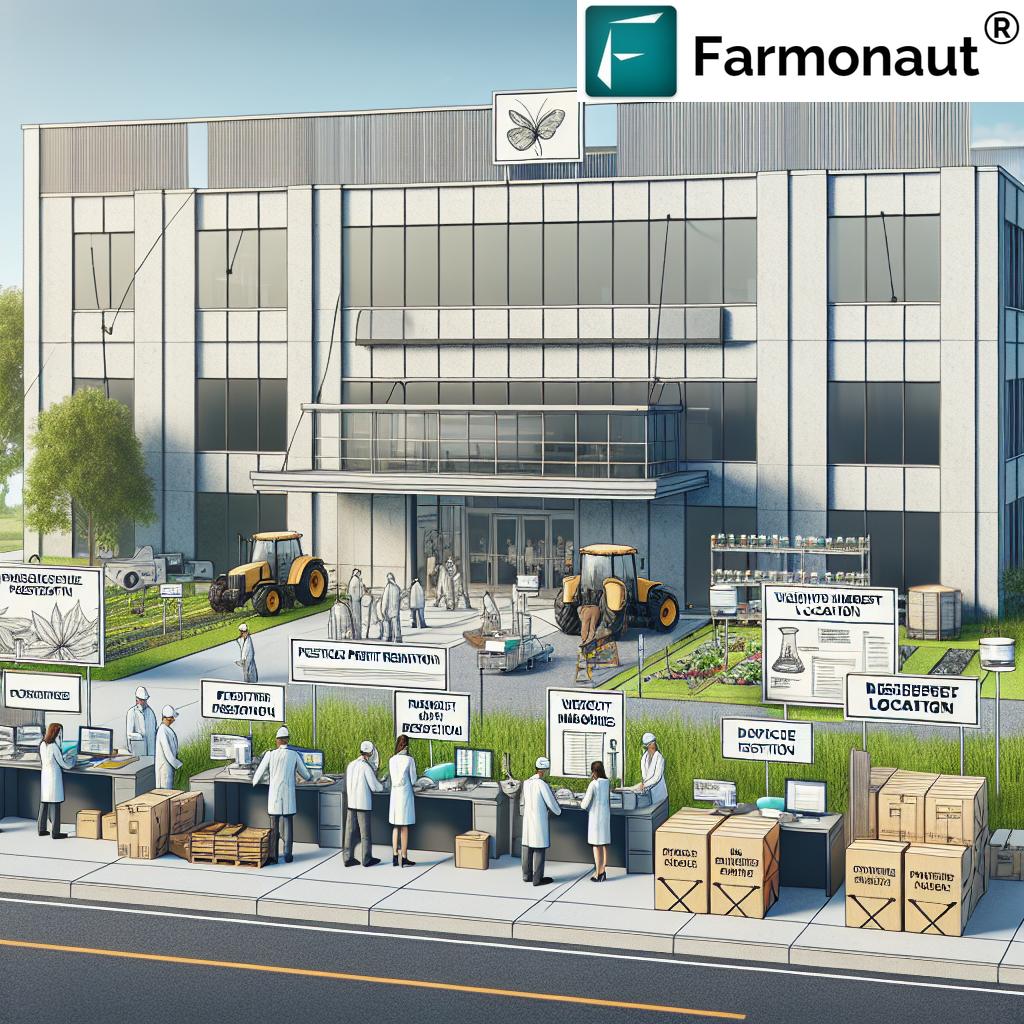Revolutionizing United States Farming: How Autonomous Tractors and Smart Irrigation Systems Boost Productivity
“Autonomous tractors can increase farming productivity by up to 30% while reducing labor costs by 50%, revolutionizing United States agriculture.”
Welcome to the future of farming in the United States! At Farmonaut, we’re excited to explore how cutting-edge technologies like autonomous tractors and smart irrigation systems are transforming the agricultural landscape. In this comprehensive blog post, we’ll delve into the world of precision farming solutions and electric farm equipment, showcasing how these innovations are enhancing productivity and promoting sustainable agriculture practices across the nation.
The Rise of Autonomous Tractors in United States Agriculture
Autonomous tractors are at the forefront of the agricultural revolution, offering a glimpse into the future of farming operations. These self-driving marvels are equipped with advanced sensors, GPS technology, and sophisticated AI systems that allow them to navigate fields with precision and efficiency.
- Increased Productivity: Autonomous tractors can work around the clock, significantly boosting farm productivity.
- Reduced Labor Costs: By automating repetitive tasks, these tractors help address labor shortages in the agricultural sector.
- Enhanced Precision: GPS-guided systems ensure accurate planting, spraying, and harvesting, minimizing waste and optimizing resource use.
One of the most significant advantages of autonomous tractors is their ability to operate in various conditions, including at night and in low-visibility environments. This flexibility allows farmers to extend their working hours and make the most of favorable weather conditions.

Smart Irrigation Systems: Optimizing Water Usage in Agriculture
“Smart irrigation systems can reduce water usage in agriculture by up to 70%, significantly enhancing sustainability in United States farming practices.”
Water management is a critical aspect of modern agriculture, especially in regions facing water scarcity. Smart irrigation systems are revolutionizing how farmers approach this challenge, offering precise control over water distribution and significantly reducing waste.
- Real-time Soil Moisture Monitoring: Sensors placed throughout fields provide accurate data on soil moisture levels.
- Weather-based Adjustments: These systems integrate local weather forecasts to optimize irrigation schedules.
- Remote Control and Monitoring: Farmers can manage their irrigation systems from anywhere using smartphone apps or web interfaces.
By implementing smart irrigation systems, farmers not only conserve water but also improve crop health and yield. These systems ensure that plants receive the right amount of water at the right time, preventing both under and over-watering.
The Role of Agricultural Data Analytics in Modern Farming
In today’s data-driven world, agricultural data analytics plays a crucial role in optimizing farm operations. At Farmonaut, we understand the power of data in revolutionizing farming practices. Our platform leverages advanced analytics to provide farmers with actionable insights, helping them make informed decisions about their crops and operations.
- Crop Health Monitoring: Our satellite-based technology allows for real-time monitoring of crop health, providing valuable NDVI (Normalized Difference Vegetation Index) data.
- Yield Prediction: By analyzing historical data and current conditions, our system can predict crop yields with increasing accuracy.
- Resource Optimization: Data analytics help farmers optimize their use of water, fertilizers, and pesticides, reducing costs and environmental impact.
To explore how Farmonaut’s data analytics can benefit your farm, check out our web application.

AI-Driven Decision-Making Tools for Farmers
Artificial Intelligence (AI) is revolutionizing decision-making processes in agriculture. AI-powered tools analyze vast amounts of data to provide farmers with personalized recommendations and insights.
- Pest and Disease Detection: AI algorithms can identify early signs of pest infestations or crop diseases from satellite imagery and sensor data.
- Optimal Planting and Harvesting Times: By analyzing weather patterns and soil conditions, AI can suggest the best times for planting and harvesting.
- Resource Allocation: AI helps farmers determine the optimal allocation of resources like water, fertilizers, and labor across their fields.
Farmonaut’s Jeevn AI Advisory System is at the forefront of this technology, offering personalized farm advisory services to help farmers maximize their productivity and efficiency.
Electric Farm Equipment: The Future of Sustainable Agriculture
The shift towards electric farm equipment is gaining momentum in the United States, offering a cleaner and more sustainable alternative to traditional diesel-powered machinery.
- Reduced Emissions: Electric tractors and other farm equipment produce zero on-site emissions, contributing to cleaner air and reduced carbon footprint.
- Lower Operating Costs: While initial investment may be higher, electric equipment often has lower operating and maintenance costs over time.
- Quieter Operation: Electric motors are significantly quieter than diesel engines, creating a more pleasant work environment and reducing noise pollution in rural areas.
From compact electric mowers for residential use to larger electric tractors for commercial farms, the range of available electric farm equipment is expanding rapidly.
Remote Equipment Monitoring: Enhancing Farm Efficiency
Remote equipment monitoring technologies are transforming how farmers manage their machinery fleets. These systems provide real-time data on equipment performance, location, and maintenance needs.
- Predictive Maintenance: By monitoring equipment health in real-time, farmers can address potential issues before they lead to breakdowns.
- Fleet Optimization: Data on equipment usage patterns helps farmers optimize their fleet size and composition.
- Theft Prevention: GPS tracking capabilities enhance security and help recover stolen equipment.
Farmonaut’s platform includes advanced fleet management tools, allowing farmers to track and manage their equipment efficiently. Learn more about our fleet management solutions in our API Developer Docs.
Eco-Friendly Farming Practices: A Sustainable Approach
The adoption of eco-friendly farming practices is crucial for the long-term sustainability of agriculture in the United States. These practices not only benefit the environment but also often lead to cost savings and improved crop quality.
- Precision Agriculture: Using technology to apply resources only where and when they’re needed, reducing waste and environmental impact.
- Cover Cropping: Planting cover crops between growing seasons to improve soil health and reduce erosion.
- Integrated Pest Management: Combining biological, cultural, and chemical methods to control pests while minimizing environmental harm.
Farmonaut’s satellite-based crop monitoring system supports these eco-friendly practices by providing detailed insights into crop health and field conditions.

Farm Productivity Optimization Techniques
Optimizing farm productivity is essential for meeting the growing demand for food while maintaining profitability. Here are some key techniques that United States farmers are employing:
- Crop Rotation: Systematically changing crops in a field to improve soil health and break pest cycles.
- Precision Planting: Using GPS-guided planters to optimize seed spacing and depth.
- Variable Rate Technology: Applying inputs like fertilizers and pesticides at varying rates across a field based on specific needs.
- Data-Driven Decision Making: Utilizing farm management software to analyze data and make informed decisions.
Farmonaut’s platform supports these optimization techniques by providing detailed field analytics and AI-driven recommendations. Explore our solutions on our Android app or iOS app.


The Impact of Autonomous Systems on Farm Safety
Safety is a paramount concern in agriculture, and autonomous systems are playing a significant role in creating safer work environments on farms.
- Reduced Human Exposure to Hazards: Autonomous tractors can perform dangerous tasks, minimizing human exposure to pesticides and other hazards.
- Fatigue Reduction: By taking over repetitive tasks, autonomous systems help reduce operator fatigue, a common cause of accidents.
- Enhanced Situational Awareness: Advanced sensors and AI systems can detect and respond to potential hazards faster than human operators.
While these technologies greatly enhance safety, it’s important to note that they require proper training and oversight to ensure safe implementation on farms.
Comparing Autonomous Farming Technologies
To help you understand the impact of various autonomous farming technologies, we’ve compiled a comparison table:
| Technology Type | Estimated Productivity Increase (%) | Environmental Impact | Initial Investment Cost | ROI Timeframe | Key Benefits |
|---|---|---|---|---|---|
| Autonomous Tractors | 20-30% | Medium | High | Medium-term | 24/7 operation, precision farming, labor savings |
| Smart Irrigation Systems | 15-25% | Low | Medium | Short-term | Water conservation, improved crop health, cost savings |
| AI-Driven Decision Tools | 10-20% | Low | Low | Short-term | Optimized resource use, improved decision-making, risk reduction |
| Electric Farm Equipment | 5-15% | Low | High | Long-term | Reduced emissions, lower operating costs, quieter operation |
| Remote Equipment Monitoring | 10-20% | Low | Medium | Short-term | Reduced downtime, optimized maintenance, improved fleet management |
This table provides a quick overview of how different technologies compare in terms of productivity gains, environmental impact, and investment considerations. It’s important to note that the actual benefits may vary depending on specific farm conditions and implementation strategies.
The Future of Farming: Integrating Technologies for Maximum Impact
As we look to the future of farming in the United States, it’s clear that the integration of various technologies will play a crucial role in maximizing productivity and sustainability. The combination of autonomous tractors, smart irrigation systems, AI-driven decision-making tools, and eco-friendly practices creates a powerful synergy that can transform agriculture.
- Interconnected Systems: Imagine autonomous tractors that communicate with smart irrigation systems to optimize soil preparation and planting based on real-time moisture levels.
- Predictive Agriculture: AI systems that can predict crop yields, pest outbreaks, and market demands months in advance, allowing farmers to plan and adapt proactively.
- Sustainable Intensification: Leveraging technology to increase crop yields while simultaneously reducing environmental impact and resource use.
At Farmonaut, we’re committed to being at the forefront of these technological advancements, providing farmers with the tools they need to thrive in this new era of agriculture.
Overcoming Challenges in Adopting New Farming Technologies
While the benefits of these advanced farming technologies are clear, their adoption is not without challenges. Here are some common hurdles and strategies to overcome them:
- High Initial Costs: Many farmers are hesitant due to the high upfront investment required. Leasing options, government incentives, and demonstrating long-term ROI can help address this concern.
- Technical Knowledge Gap: The complexity of new technologies can be daunting. Providing comprehensive training and ongoing support is crucial for successful implementation.
- Connectivity Issues: Many rural areas lack the robust internet connectivity required for some smart farming technologies. Improving rural broadband infrastructure is essential for widespread adoption.
- Data Privacy and Security: As farming becomes more data-driven, ensuring the security and privacy of farm data is paramount. Clear data policies and secure systems are necessary to build trust.
Farmonaut is committed to addressing these challenges by offering user-friendly interfaces, comprehensive support, and secure data management practices.
The Role of Government and Industry in Supporting Agricultural Innovation
The transition to more technologically advanced and sustainable farming practices requires support from both government and industry. Here’s how these sectors are contributing to the agricultural revolution:
- Research and Development Funding: Government grants and private sector investments are crucial for developing new agricultural technologies.
- Policy Support: Implementing policies that incentivize the adoption of sustainable and efficient farming practices.
- Infrastructure Development: Improving rural internet connectivity and modernizing transportation networks to support smart farming technologies.
- Education and Training Programs: Collaborations between educational institutions, industry, and government to provide farmers with the skills needed to leverage new technologies.
These collaborative efforts are essential for creating an environment where innovative farming practices can flourish, benefiting both farmers and the broader society.
Farmonaut: Your Partner in Agricultural Innovation
At Farmonaut, we’re dedicated to empowering farmers with cutting-edge technology and data-driven insights. Our platform offers a comprehensive suite of tools designed to enhance farm productivity, sustainability, and profitability.
- Satellite-Based Crop Monitoring: Real-time insights into crop health and field conditions.
- AI-Powered Advisory Services: Personalized recommendations for optimal farm management.
- Weather Forecasting and Analysis: Accurate weather predictions to inform farming decisions.
- Resource Management Tools: Optimize the use of water, fertilizers, and other inputs.
We invite you to explore our solutions and see how Farmonaut can help revolutionize your farming practices. Visit our API page to learn more about integrating our technology into your existing systems.
Frequently Asked Questions
Q: How do autonomous tractors improve farm productivity?
A: Autonomous tractors enhance productivity by operating 24/7, performing precise operations, and reducing labor costs. They can work in various conditions, including at night, maximizing field time and efficiency.
Q: Are smart irrigation systems suitable for all types of crops?
A: While smart irrigation systems can benefit most crops, their effectiveness may vary. They are particularly useful for water-intensive crops and in regions with water scarcity. The systems can be customized to meet the specific needs of different crops and soil types.
Q: How does Farmonaut’s technology integrate with existing farm equipment?
A: Farmonaut’s platform is designed to be compatible with a wide range of farm equipment. Our API allows for integration with various systems, and our satellite-based monitoring can provide insights regardless of the equipment used on the farm.
Q: What is the typical return on investment for implementing these new farming technologies?
A: The ROI varies depending on the specific technology, farm size, and crop type. However, many farmers report seeing returns within 2-3 growing seasons through increased yields, reduced input costs, and improved efficiency.
Q: How does Farmonaut ensure the security of farm data?
A: We take data security very seriously. Farmonaut uses advanced encryption methods to protect all data transmissions and storage. We also have strict data privacy policies in place to ensure that farm data is never shared without explicit permission.
Conclusion: Embracing the Future of Farming
The agricultural landscape in the United States is undergoing a dramatic transformation, driven by innovative technologies like autonomous tractors, smart irrigation systems, and AI-powered decision-making tools. These advancements are not just improving productivity; they’re also paving the way for more sustainable and environmentally friendly farming practices.
At Farmonaut, we’re proud to be at the forefront of this agricultural revolution, providing farmers with the tools and insights they need to thrive in this new era. By embracing these technologies, farmers can look forward to increased yields, reduced costs, and a more sustainable future for agriculture.
We invite you to join us on this exciting journey. Explore our solutions, try our platform, and see for yourself how Farmonaut can help transform your farming operations. Together, we can build a more productive, sustainable, and prosperous future for agriculture in the United States and beyond.










